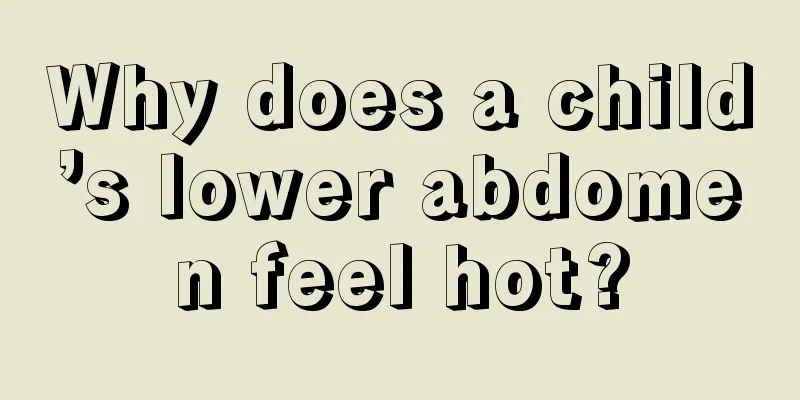What are the symptoms of mental retardation in babies?

|
As parents, we all hope that our children can grow up smoothly and be smart when they grow up. If they are smart, parents don’t have to worry about them in the future. However, what we are most afraid of is that the children will have low intelligence during the development process. Because the children are still very young, we cannot detect the symptoms of low intelligence even if there are symptoms. After all, we are not professional doctors and cannot tell whether the baby’s intelligence is low from the appearance. So what are the symptoms of low intelligence in babies? 1. The earliest manifestation of mentally retarded children is that they often have difficulty in feeding, sometimes they cannot suck, and they are particularly prone to spitting up milk; Second, they tend to sleep longer, be very quiet all day, and rarely cry; 3. Normal children will smile at their mothers 4-6 weeks after birth, but children with intellectual disabilities often cannot smile until 3 months old. 4. It takes longer than normal children to master various movements (such as sitting, standing, walking, and talking); 5. Not interested in the surroundings and not looking at the things around; 6. Normal children often like to put objects in their mouths when they are 6-10 months old, but this behavior gradually decreases after the age of 1. Children with intellectual disabilities often put blocks or other objects in their mouths when they are 2-3 years old. 7. The child still drools frequently after the age of 2-3 years; 8. Children with intellectual disabilities cry sharply or weakly, and their tone lacks variation. When external stimuli cause crying, the period from the start of the stimulus to the onset of crying is relatively long, and only repeated stimulation of the four factors will cause crying; 9. Not interested in toys and won’t play with them even if they have them; 10. From sleeping a lot when he was a child to being active all day long without any purpose. Are the above-mentioned symptoms present in every mentally retarded child in their early years? It cannot be said that everyone with one or several of them is mentally retarded. Many other tests are needed to confirm the diagnosis of mental retardation. 11. Difficulty in eating: occurs in infancy. The earliest symptoms shown by infants with mental retardation are often difficulty in feeding, inability to suck, and being particularly prone to spitting up milk, which indicates damage to the nervous system and will affect their intelligence in the future. After adding complementary foods at the age of six months, the baby has difficulty chewing and feeding, and has difficulty swallowing solid food, which may cause vomiting. 12. Abnormal facial features or body shape. Some babies with congenital mental retardation have abnormal facial and body appearance. For example, children with congenital idiocy have eyes that are too wide apart, slanted eyes, flat noses, tongues that often hang outside the mouth, and drooling, which is what people often call an "international face." Children with hydrocephalus have particularly large head circumference, while children with microcephaly have particularly small heads. People with hypothyroidism are particularly short, people with phenylketonuria have abnormally white skin and very light hair, etc. 13. Slow motor development: Babies with intellectual disabilities have significantly slower motor development than normal babies. In short, if a child's intellectual development is low, similar symptoms will occur. We should observe the child's symptoms more often. If we find that the child has such symptoms, we must take the child to the hospital in time to check the brain and do a brain CT scan. If the child is found to have symptoms of intellectual disability, the child must be treated in time. If it is not cerebral palsy, then intellectual disability can be improved in time. |
<<: What should I do if my baby has anemia for a long time?
>>: Is moderate anemia in babies serious?
Recommend
Key points for the care of premature babies: these points must be paid attention to
Compared with full-term babies, the care of prema...
What are some tips for baby's stuffy nose?
Now with the arrival of spring and summer, the we...
Is childhood asthma contagious?
It is easy for babies to be infected with respira...
What to do if your child can't poop?
Not only adults will suffer from constipation, ma...
What should 4-year-old children with iron deficiency anemia eat?
What is iron deficiency anemia in 4-year-old chil...
The difference between a child's fever and headache and encephalitis
Many parents know the consequences of encephaliti...
What to do if your one-year-old baby falls on the back of his head
There are always some bumps and bruises in our li...
What are the symptoms of tuberculosis in children
Getting sick is something we don’t want to happen...
Does baldness on the back of the head necessarily mean calcium deficiency?
Many parents may think that their children’s bald...
Why is the baby's lower eyelid red?
If the baby's lower eyelids are red, parents ...
What should I do if my two-year-old baby has a cough and runny nose?
Two-year-old babies are relatively young and have...
How to prevent children from pollen allergies
In the spring season, there are many flowers in f...
What are congenital malformations in children?
Children are the flowers of the motherland, and e...
What to do if your baby has a fever in spring
The climate begins to gradually warm up in spring...
What is the normal value of bilirubin in infants?
There are many common diseases among infants. Whe...









